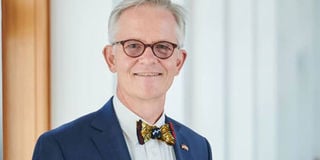Celebrating German National Day and Ugandan devt cooperation

German Ambassador to Uganda Matthias Schauer. PHOTO | COURTESY
What you need to know:
- Turning to the second anniversary we are celebrating: This year we are happily looking back on 60 years of development cooperation between the Germany and Uganda. For 60 years, Germany has been supporting the Ugandan people in many different ways.
Today, October 3rd Germany is celebrating its National Day. 34 years ago - after 41 years of separation - East and West Germany were reunited.
East Germany was a communist dictatorship with a state-run economy and part of the Soviet-led Warsaw Defense Pact.
West Germany was a liberal democracy with free market economy and part of the western Defense Alliance NATO. And yet, after the fall of the heavily guarded Berlin Wall in November 1989 the two countries became one again – without a single shot being fired. To me, this is still a true miracle for which I am immensely grateful.
What led up to these events? After NAZI-Germany had lost World War II the Allied Powers divided it into 4 sectors, the US, the British and the French became West Germany and the Soviet Russian sector became East Germany in 1949.
People in the East were not happy with the political and economic conditions they lived in. It was the arrogance of the communist party claiming to know what is best for the people that led to its downfall. It considered criticism of government policy as a hostile act that threatened the stability of the system. Therefore, the opposition went underground.
It is actually this lack of dialogue, this disconnect between a government and its citizens that was the threat to stability. Who knows, maybe East Germany would still exist if the party leadership had been willing to listen to critical citizens and enable real participation from civil society.
Turning to the second anniversary we are celebrating: This year we are happily looking back on 60 years of development cooperation between the Germany and Uganda. For 60 years, Germany has been supporting the Ugandan people in many different ways.
Many things have changed in those 60 years but one thing that hasn’t is our approach to a development partnership. Uganda as the host country is in the driver’s seat. It is Uganda’s ambitious strategies and objectives that guide our cooperation. Without the ownership of the Ugandan Government and the Ugandan people, our cooperation would not only be a bad partnership, but it also simply wouldn’t work.
Partnerships are not always easy and at times, there are disagreements. At the moment, Germany is concerned about the human rights situation in Uganda in particular with regard to the discrimination of individuals affected by the Anti-Homosexuality Act and the infringement on civil rights.
And the atmosphere of distrust towards NGOs which we sometimes observe is also not helpful. But during our long-standing partnership, Uganda and Germany have proven that they are able to have a dialogue also on controversial issues. On this basis, I am confident that we will continue our cooperation for many more years to come.
Last year, in 2023, Germany supported Uganda with grants of more than Shs48 billion (11.7 million EUR) in humanitarian assistance and Shs322 billion (78 million EUR) in development cooperation. More and more, we have been focusing our interventions in refugee-hosting regions, in particular West Nile. I am extremely impressed by the generosity of the Ugandan people that welcomed more than 1.7 million refugees so far. This open-door policy is exemplary in the world.
Let me also mention a few examples of our long-standing cooperation in energy, water and sanitation and rural development. Key achievements in these areas include; the completion of the transmission line Mutundwe-Entebbe, the installation of 25 mini-grid systems, providing electricity to over 11,500 people in Northern Uganda, the rehabilitation of 23 water supply systems, improving water access for up to 216,000 refugees and host community members, increasing access to drinking water from 21 percent to 85 percent in Gulu, securing land rights for over 90,000 households, (6) providing agricultural loans to over 13,500 people.
And finally, I want to acknowledge and appreciate the over 100 private initiatives in Germany that have actively raised funds to give support especially in the fields of health and education across the whole country.
German Ambassador Matthias Schauer




